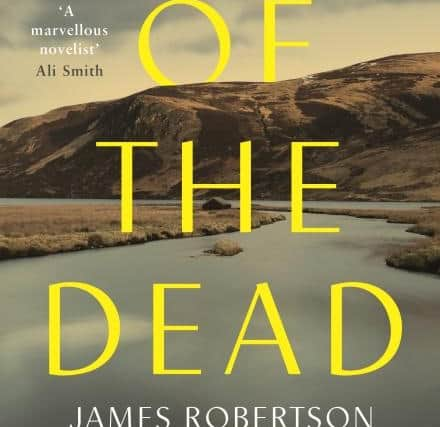Book review: News of the Dead, by James Robertson


James Robertson is an extremely fine novelist and more than once has been described as a chronicler of Scotland. It is easy to see why. His debut, The Fanatic, moved between 17th century religious hypocrites and Scotland on the eve of the referendum about the devolved Parliament. Joseph Knight, set in the 18th century, was forensic about Scotland’s attitudes towards slavery. The Testament Of Gideon Mack was about a contemporary Scottish minister’s crisis of faith, or rather his crisis of his lack of faith, and was a brilliant work of diablerie. And The Land Lay Still was a fragmented epic dealing with history within living memory, from the end of the Second World War to the eve of another referendum. The Professor Of Truth was a lightly fictionalised investigation into a Lockerbie-like disaster. To Be Continued, a comic romp of the first water, might seem like an outlier, but even here he dealt with Scottish stereotypes, both enforced and self-nurtured, with remarkable acuity.
It is therefore unsurprising that part of his new novel involves a chronicle, albeit a fictitious one. It is a trio of narratives that finally waltz and weave together. It begins in the present day with Maja, one of the oldest residents of the equally fictitious Glen Conach, being visited by a local boy who claims to have seen a ghost. Eerily, he thinks the ghost might have been her. She will have other visitors before the end of the novel.
Advertisement
Hide AdIn 1809, Charles Kirkliston Gibb goes to Glen Conach. He is an antiquarian, but he is a light-fingered scoundrel and inveterate sponger. That he is actually quite a likeable character is in part because, in his journal, he is completely self-conscious about his pilfering, double-thinking and capacity to know when he might have outstayed his host’s hospitality. The book he is transcribing and translating is The Book Of Conach, a chronicle – but not a hagiography – of the local saint who was never made a saint. So the third part of the novel consists of extracts from his work on this, although whether they are wholly accurate and unadulterated might be in question. These parts are done very well indeed, and I write that as somebody who has read such works as William of Malmesbury’s Miracles of the Blessed Virgin Mary. The impersonation is not satire, nor is it uncomplicated.


This is a glorious amalgam in that some parts are very funny indeed, and others are Robertson at his most polemical. If And The Land Lay Still captured a country holding its breath to find what might happen next, this book is more of a growing roar. From the Pictish and legendary saint, arriving in an area still pagan and wracked by plunderers, to the 19th century estates which are gradually diminishing through the Clearances and the lack of opportunity, to the 21st century and the glen poised between community buy-outs, wind farms and an ebbing of the young, Robertson braids a picture of ownership, inheritance and family that is subtle and moving.
It has very clever grace notes. When Kirkliston is trying to ascertain whether the Baron – or Glen Conach has he prefers to be called – is a Jacobite, he notes “He is surely a Tory but even sixty years since that does not oblige a man to be a Jacobite… It is part of our character, I think, to love a lost cause”. Alert readers will realise that “sixty years since” was the subtitle to Walter Scott’s Waverley, about the Jacobite uprising. The Baron is very much in the mould of Scott’s Baron Bradwardine, being affable, forgetful, annoying, sentimental and loyal to his own place. That there are waterfalls and songs and one character being called Flora adds to the patina of this being Scott, but re-purposed and reverse-engineered. There are other literary references, including to Smollett (the first truly British novelist and a writer with a fondness for rogues), to Ossian, to the now almost entirely unread Gertrude Of Wyoming by Campbell. You do not need to get the references, but they are played to great effect.
Part of the contemporary narrative involves other researchers looking into the Conach story, and speaking to Maja. There is a tension between oral traditions and textual traditions which is reiterated in the past with the Baron’s daughter and her scepticism about their scholarly guest. But the centre point is the words attributed to a dead local worthy. Speaking about dyking, he says “It’s jist fillin in spaces”. The novel, in many ways, does just that.
Robertson has always been a quietly experimental novelist, as with his collection of stories 365. The same is true here, with passages written in Scots, and points where the characters deliberately change register between English and Scots, and fleeting bits of Latin. But it is the ending which links it all into a piece, a genuine cadenza on immigrant and emigrant, of brutality and unexpected kindness, of expulsion and fleeing, of what constitutes being someone who belongs as well as longs.
Several people I know have also read News of the Dead and we are of one mind: this is a superb book, and how the stories coalesce is the engine behind turning the page. It is not a book that anyone will forget quickly.
Advertisement
Hide AdNews Of The Dead, by James Robertson, Hamish Hamilton, £18.99. James Robertson is appearing at the Edinburgh International Book Festival on 16 August, www.edbookfest.co.uk
A message from the Editor:
Thank you for reading this article. We're more reliant on your support than ever as the shift in consumer habits brought about by coronavirus impacts our advertisers.
If you haven't already, please consider supporting our trusted, fact-checked journalism by taking out a digital subscription at https://www.scotsman.com/subscriptions